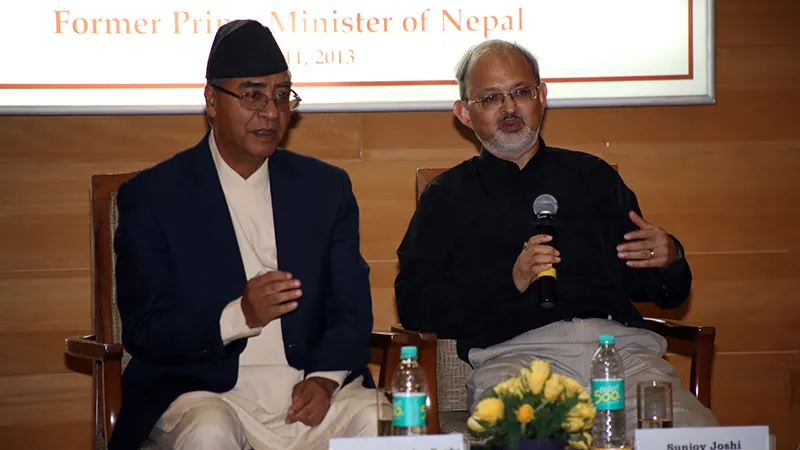-
CENTRES
Progammes & Centres
Location
Nepal's former Prime Minister Sher Bahadur Deuba has stressed on the need to develop "a joint approach" with India to exploit the huge hydro power potential of the country. He said Nepal has the potential of generating over one lakh megawatts of power.

Former Prime Minister of Nepal and senior leader of Nepali Congress, Sher Bahadur Deuba, has sought India’s "goodwill and logistics support" for holding elections to the Constituent Assembly (CA) later this year.
Addressing a gathering of larger research community of New Delhi and media at the Observer Research Foundation (ORF) on June 11, he said Nepal is in a crucial phase of democratic transition and the government and the political parties are working hard to ensure that the CA-cum-parliamentary elections are held by November this year.
Deuba also sought India’s support "in encouraging the Maoists to adopt peaceful means for politics for now and forever".
The address and discussion was moderated by ORF Director Sunjoy Joshi.
Stating that he is confident of the Nepali Congress heading the next government, Deuba also stressed on the need to develop "a joint approach" to exploit the huge hydro power potential of the country. He said Nepal has the potential of generating over one lakh megawatts of power.
He said development of water resources for mutual benefit is a key area of priority for him. He noted that it was during his tenure in 1996 that the historic Mahakali treaty and a trade treaty were signed. It was during his earlier visit to India as Prime Minister from February 11-17, 1996 that the historic Treaty concerning the integrated Development of the Mahakali River, including Sarada Barrage, Tanakpur Barrage and Pancheshwar Project (The Mahakali Treaty) between India and Nepal was signed.
The former PM said that the joint work on the utilisation of water resources would also help in irrigation, flood control and mitigating climate change challenges that the region will be facing in the near future.
Deuba said Nepal wants to participate in the exemplary progress of India and creating "synergy between Nepal’s resources and India’s capital, knowledge and technology" would be a good idea to achieve goals of economic transformation for both the countries.
Inviting Indian private sector to invest in Nepal, Deuba said Nepal would work towards improving the investment scenario after the elections, learning from India’s economic growth since the end of licence raj.
The other possible sectors for joint work, Deuba said, are tourism, developing new road networks and upgrading the existing ones and harnessing knowledge economy. Deuba laid stress in the need to develop infrastructure to boost tourism.
It is in this regard that Deuba has sought Indian assistance in five important projects in Nepal, namely construction of a bridge on the Mahakali River to connect Mahendranagar with Banbasa, and for Kathmandu-Nijgadh fast track road. Likewise he sought Indian assistance in the construction of a suspension bridge from Gojbuda VDC to Punaravedi and to build an Institute of Technology in the far-western region where his constituency lies. The proposal for building this Institute has been on the cards since 2002 and was taken up with then Prime Minister of India Atal Bihari Vajpayee.
Dismisses trilateral cooperation
During the question and answer session, Deuba resisted from speaking about the trilateral cooperation mechanism floated by Chairman of United CPN (Maoist) Prachanda during the latter’s visit to New Delhi in May this year. Responding to a question on what he thought about the cooperation model between India and China, Deuba said, "It is up to him (Prachanda) and I don’t have to comment about it."
He, however, said that India should help Nepal to develop hydro-projects and encourage Indian investment in Nepal.
Asked how his party will perform in the next elections, Deuba said that if there is free and fair election, "NC will come out as a majority party as it is the only historic party that believes in multi-party democracy."
On the question on what will NC do to reach out to the marginalised groups, Deuba stressed on reservation approach. He said that the Dalits, Madhesis, tribal groups, youth and other marginalised groups are "disillusioned with the Maoists." He added, "They have all realised Maoist propaganda. And now they will support us (Nepali Congress)."
Deuba dismissed all possibilities of revival of constitutional monarchy in Nepal and tried to convince the gathering that the elections for a new CA will be held in November this year.
"Monarchy created too much problem for the country. Today there is no support for monarchy," he stated.
(The report is prepared by Akanshya Shah, Associate Fellow, Observer Research Foundation, Delhi)
The views expressed above belong to the author(s). ORF research and analyses now available on Telegram! Click here to access our curated content — blogs, longforms and interviews.